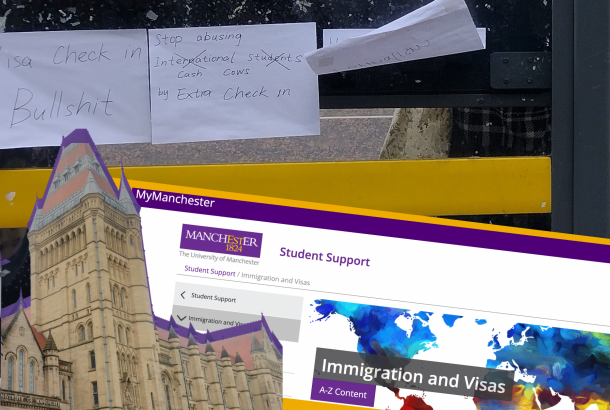The students ready to fight back: does Fallowfield need a ‘first response’ group?
By Emily Broncz and Josh Sandiford

A post on Fallowfield Students Group quickly gathered over 600 reacts after calling for a ‘first response’ group to help victims of crime in the area. Daniel Richards, a third-year undergraduate student at The University of Manchester, created the post on 25thJanuary, voicing concerns over the increasing number of posts featuring on the Facebook group detailing experiences of burglaries or attempted break-ins.
Daniel described how FSG acts as an important public forum for students to speak out about different aspects of criminal activity, likening the group to a “rolling news feed” of reports from students themselves. The stories represented through these posts illustrate a rich variety of outcomes, as further explained by Daniel: “I have heard some great stories of responsive, fast, kind, and caring police officers and I’ve heard stories in which the police fail to turn up.”
Speaking about his motivation to publish the post, Daniel shared his interactions with personal accounts from his peers, both those who were friends as well as strangers: “Part of the reason I decided to question whether there was something we could do about it was that a friend told me recently that they’d been broken into for the second time in 6 weeks; they feel watched in their own home and often hear people throwing rocks at their windows to see if they’re in.”
The Mancunion contacted Katrina Monk, a Drama student at the University of Manchester, who had recently used the platform to inform others about her frightening experience with a burglar.
She said: “It was 4 am and four or five residents were in the house. Someone kicked the front door down and attempted to get [into] my housemates’ room by seeing if it was unlocked. When he realised that it was locked, he did a run up to my room — down the hall — which was also locked and kicked the frame in. I woke up to the noise of this and he threw my [close-by] bin at me after I screamed alerting the rest of my housemates.”
She added: “He also appeared really manic like he was on drugs and screamed at me in another language. I had my laptop next to me on my bed, so I handed it [to] him and he ran out slamming the front door behind him.”
Katrina says the police did not arrive at her house until 18 hours later, despite calling them immediately after the incident. She said that even though her landlord did all they could to ensure the safety of her ground room floor, she “definitely doesn’t feel safe” living in Fallowfield.
With cases like Katrina’s, where the first steps towards a solution have been received nearly a day later, a demand has been allowed to develop for a more instant response. This is one of the most compelling factors which motivated Daniel to call for the creation of a ‘first response’ group. Examples like these show that there is little to no support currently in place for distressed students experiencing very real and shocking crime.
Opportunist thieves often look for houses which show clear signs of poor levels of security. Daniel stated that one of the most common factors seemed to be the “bare minimum security” which some landlords offered their tenants. Recounting just a few anecdotes he had read on FSG, he recalled some of the most frequent methods used by criminals: “old doors being kicked in or flimsy, glass-panelled doors being smashed, gates kicked down, and even people climbing through really poorly placed windows.” The police offer advice on their website as to how to improve security around doors and windows. Bars offer a greater level of strength when combined with locks on doors, laminated glass can aid in making glass panes on doors less vulnerable, and key operated locks can be fitted to most windows.
A concern shared by many students is what can they do in the window between the crime taking place and the matter being taken into the hands of the police, council, and their landlord. According to GMP, burglaries in the Fallowfield area made up 15.5% of all reported crimes committed in the area in 2018, with 1405 cases altogether being recorded. Worryingly, out of a total of the 6636 reported cases, which also includes robbery and theft as well as sexual violence, 86.04% received no further action. Only 123 offenders were dealt with at court, which amounted to 1.59% of reported criminal acts ending in this outcome.
Daniel shared his view that it was important to offer help to students for who had not been afforded the luxury of having a support network around them: “…most people who are victims of crime would call friends, talk to housemates…some people don’t have this…especially at the beginning and end of terms when there might only be one or two people in a large house.” In outlining his main objectives for the project, he was keen to stress that the central idea behind the group was not “to take over the role of policing,” but instead “be there to give support and advice to victims.”
In a statement released to The Mancunion by GMP, Chief Inspector Fahar Zaman stressed that as such a project like this had not fully been “organised in conjunction with the police,” they were not in a position to “advocate people taking the law into their own hands.” Speaking further on the matter, Zaman explained that whilst “intelligence-led community policing” is useful to the police and that they “appreciate” the fact that many students in the area wish to help, these projects would first have to clear any “appropriate safeguarding protocols.”
This was an issue which Daniel also fully acknowledged: “sufficient checks and balances [are needed] to ensure that we do not put potentially dangerous or badly intentioned volunteers in positions where they have access to vulnerable people or victims of crime.”
The police also claimed that having student volunteers working alongside the police would be a possible method of allowing them to “work closer with the community.” Daniel suggested that there may be opportunities to blend the work of previously established projects, such as the University’s Nightline, a student-operated nighttime telephone service, and local renter’s union ACORN. He also commented that a “public meeting” could be hosted in the coming weeks to see which facilities are used and what could be implemented to further help students.







